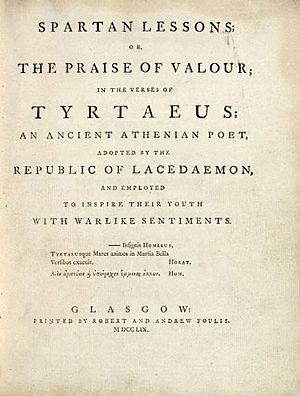Robert Foulis (printer) facts for kids
Robert Foulis (born April 20, 1707, in Glasgow; died June 2, 1776, in Edinburgh) was a famous Scottish printer and publisher. He was known for making high-quality books.
Contents
Robert Foulis: A Life in Books
Robert Foulis was the son of a man who worked with malt. He first started learning to be a barber. However, a smart philosopher named Francis Hutcheson was very impressed by Robert's skills. He encouraged Robert to become a publisher instead.
Starting a Printing Business
In 1738 and 1739, Robert traveled through England and France. He was with his brother, Andrew, who had a better education and was planning to become a church minister. After their travels, Robert started his own publishing business in Glasgow in 1741. By 1742, he had his own printing press.
He bought his printing type (the metal letters used for printing) from a well-known type-maker named Alexander Wilson. In 1743, Robert was given an important job: he became the official printer for Glasgow University. That same year, he printed the very first Greek book ever published in Glasgow. It was called De Elocutione by Demetrius Phalereus. This book was also available in Latin.
Working with His Brother
Soon after, Robert teamed up with his brother Andrew. Their printing press became famous for producing books of excellent quality. They printed books in English, Latin, Greek, French, and Italian. People sometimes called the brothers "the Elzevirs of Britain." This was a big compliment, as the Elzevirs were a famous family of Dutch printers known for their beautiful books.
The Foulis brothers worked very hard to make their books perfect. Robert even traveled to France to find old, rare manuscripts of classic writings. He also hired a skilled engraver and a copper-plate printer to help with their work.
Famous Books from the Foulis Press
The Foulis press published works by many important writers. These included Homer, Horace, Milton, and Thomas Gray. One of their most famous books was Homer's work, which featured designs by John Flaxman.
Another well-known book was a small edition of Horace's writings. For a long time, people thought this book had no mistakes at all. The Foulis brothers even put up notices at the university and offered a reward if anyone found an error! However, at least six mistakes were eventually found.
An Art Academy and Its Challenges
The Foulis brothers had a big dream: they wanted to create a special school to support the fine arts. One of their main supporters, the Earl of Northumberland, advised them to "print for posterity and prosper." This meant he wanted them to focus on printing books that would last forever and make money.
But the brothers spent a lot of their money on collecting art. They bought paintings, sculptures, and models. They also paid for young artists to get an education and travel. They even paid for copies of famous artworks from other countries.
Sadly, this "Academy" did not succeed. It caused the brothers to lose a lot of money. Robert went to London, hoping to sell his art collection for a large sum. But the artworks sold for much less than he expected.
Robert's Legacy
Robert Foulis wrote a book called Catalogue of Paintings with Critical Remarks. After his death, his son Andrew continued the printing business under the same name.
A book from 1831, called Notices and Documents illustrative of the Literary History of Glasgow, lists all the works printed by the Foulis press. It also lists the pictures, statues, and plaster busts made at their "Academy" at Glasgow University.
The brothers' names often appear on the title-pages and colophons (the end notes) of their books. They used their Latinized names: "Robertus et Andreas Foulis".
Robert and Andrew Foulis were buried in the Ramshorn Cemetery. Today, because a street was made wider, their graves are now under the pavement. However, their initials are still marked in the paving stones.
 | Janet Taylor Pickett |
 | Synthia Saint James |
 | Howardena Pindell |
 | Faith Ringgold |


